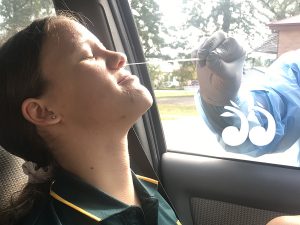Coronavirus: Continual Testing Needed Locally
ALTHOUGH COVID restrictions have eased, ongoing testing for coronavirus is essential.
Local health workers are urging people to continue to be active in identifying even the mildest symptoms and maintaining personal hygiene.
Dr Richard Abbott said Scone has been “quite good” in being tested and self-isolating if they notice symptoms, but it is critical this continues each time someone has even the mildest symptoms.
“Ongoing testing is essential because you don’t know if you’ve got a cough or cold and what’s actually causing it,” said Dr Abbott.
“It could be one of the common viruses or common cold, but it also could be coronavirus,” he said.
“That’s why we’re asking anybody with symptoms to get tested, but also anyone with symptoms should be self-isolating and keeping out of circulation until either their symptoms improve or their test comes back negative,” he said.
Tests are available by phoning the local hospital and arranging an appointment at the drive through clinic.
The basic advice of social distancing and hand hygiene are still key to combating a resurgence of the virus.
“I think people should be aware that just because restrictions are being lifted slowly, this is still a critical time to watch the evolution of this virus and so the testing, social distancing, and hand washing are critical now and must be maintained,” said Dr. Abbott.
Dr. Abbott also re-iterated that the test is not 100 percent accurate and those who have continuous symptoms should seek to be retested.
“Just because you’ve had one test doesn’t mean you can just forget about it,” said Dr. Abbott.
“We know there is a pool of COVID patients who are asymptomatic,” he said.
“People who are tested should certainly self-isolate until they get results because there’s no point in getting a test and going back to work,” he said.
The initial screening test includes an assessment of symptoms, including temperature and a series of context questions followed by a nasopharyngeal swab which is sent off to a lab.
“The tests take about 48 hours, sometimes as long as 72 to come back and for medical or essential workers we can sometimes fast track that,” said Dr. Abbott.
When asked about the potential risk of a second wave impacting Scone or surrounding areas, Dr. Abbott said it would be quite manageable.
“We’re in a better place than we were two months ago with more equipment…we can get second and third waves as time goes by, so we need to maintain our vigilance and use the techniques to reduce it,” said Dr. Abbott.
“The good behaviours of the population have allowed the public health authorities to become orgainsed so what would happen is they would come in and do contact tracing, look at increasing isolation and notify people to social distance again,” he said.
“The main key is contact tracing…I know some people are using this app, just keep aware of where you’ve been in the last week or two so if there happens to be an outbreak public health can work out who needs to be tested or self-isolate,” Dr. Abbott said.
Tags: Coronavirus, Covid-19, safety, test
 scone.com.au
scone.com.au